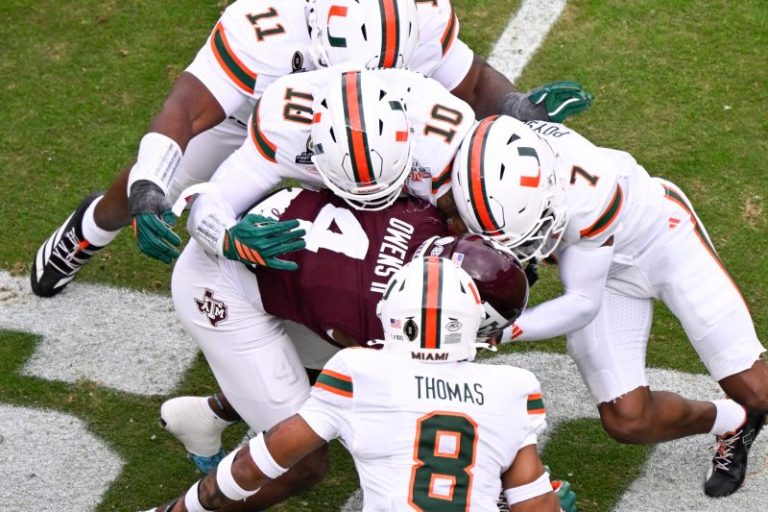No. 5 seed Oregon defeated No. 12 James Madison 51-34 in the first round of the College Football Playoff.
Ducks quarterback Dante Moore threw for 313 yards and had five total touchdowns in the dominant victory.
Oregon will now face No. 4 Texas Tech in the Orange Bowl on New Year’s Day.
On paper, it was the biggest mismatch in the first round of the College Football Playoff as No. 5 seed Oregon were overwhelming favorites against No. 12 James Madison.
It went exactly as thought. The Ducks zoomed past the Dukes right out of the gates and never looked back in a dominant 51-34 win to cap off the opening round of the playoff. Next up for Oregon is a quarterfinal date with No. 4 Texas Tech in the Orange Bowl on New Year’s Day.
Both teams were among the most balanced in the country with each among the four teams − alongside Indiana and Texas Tech − to rank in the top 10 in scoring offense and defense. Yet the Sun Belt champion didn’t hold up against the big-play capabilities of the Ducks.
Oregon’s Dan Lanning is as aggressive as coaches come, and showed he wanted to get the scoreboard operator working quickly by putting his high-powered offense on the field first. It took just four plays, with Jamari Johnson making a one-handed catch on the run for a 41-yard touchdown.
While the James Madison offense was able to put up a field goal on its opening drive, it couldn’t sustain success against one of the nation’s top defenses. Even worse, the Dukes defense simply couldn’t stop Oregon’s offense.
By the time quarterback Dante Moore found Jeremiah McClellan in the end zone for a touchdown in the second quarter, Oregon had run 16 plays – six of them for at least 20 yards – and scored 27 points, the only blemish a failed 2-point conversion.
The Ducks would add another touchdown, giving it five on their first five drives, and lead 34-6 at halftime.
The entire Oregon offense shined, yet Moore stood out as he completed his first eight passes and had four scores in the first half. He finished 19-for-27 with 313 yards, five total touchdowns and two interceptions. Malik Benson had 119 receiving yards and two scores, leading the seven Ducks that caught a pass.
James Madison only allowed 247.6 yards per game, second-best in the country, entering the contest but it only took four drives for the Ducks to surpass that mark. Oregon finished with 514 total yards.
James Madison showed life in the second half with an early touchdown, but the Ducks responded with score from Benson and another on a blocked punt to put the game away.
Dukes quarterback Alonza Barnett III was 23-for-48 with 273 yards and two passing touchdowns and a score on the ground. Running back Wayne Knight ran for 110 yards on 17 carries to key a rushing attack that put up 186 yards.
It was the third consecutive double-digit win for Oregon and 10th of the season. The 51 points was the most James Madison had given up this season, and seventh time a team eclipsed the 50-point mark in the playoff.
The win starts what Lanning hopes is a redemption arc as Oregon still seeks its first national championship. Last season, his team went into the playoff undefeated and No. 1 in the country, only to be dominated in its opening contest by eventual champion Ohio State in the Rose Bowl. It’s Oregon’s first College Football Playoff win since the inaugural season in 2014 when it beat Florida State in the Rose Bowl.
The opening round ends with a tough showing for the Group of Five teams; James Madison and Tulane each suffered lopsided defeats after the Green Wave were crushed by Mississippi 41-10 earlier in the day.
Bob Chesney’s time with the Dukes also ends as he is now the coach at UCLA. Former Florida coach Billy Napier will take over James Madison next season.










